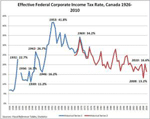Canada: Taxes and wages fall while corporate profits rebound
Published on Mon, 2012-03-12 08:43
“In Canada, federal taxes on profits had fallen to 16.6 per cent by fiscal 2010-11 after briefly dipping to 13.2 per cent in 2008, a level not seen since the Great Depression,” wile corporate profits “have rebounded since the 2008-9 crisis, nearing the previous high water mark,” wrote Armine Yalnizyan, senior economist at the Canadian Centre for Policy Alternatives (CCPA), one of the focal points of Social Watch in the North American country. “Lower taxes and lower wages: It's a one-two punch that has been hard to duck in the post-crisis period, and not because business is on the ropes,” Yalnizyan summarized in a column published by The Globe and Mail daily newspaper. “Despite growth, there is no shortage of profitable firms telling workers they can keep their jobs only if they agree to get less,” she concluded. Yalnizyan’s column reads as follows Why we're seeing the ugly new face of capitalism Capitalism has entered an ugly new era that may work well for the shareholders of the world, but not for the rest of us. I was struck by a story that broke the same day Caterpillar Inc. shuttered its London, Ont., locomotive plant and headed to low-wage Indiana. The Wall Street Journal reported that U.S. corporate tax receipts, as a share of profits, had dropped to their lowest level in at least 40 years. Lower taxes and lower wages: It's a one-two punch that has been hard to duck in the post-crisis period, and not because business is on the ropes. Like Caterpillar, the American business sector as a whole has been booking record profits. Stubbornly high unemployment, talk of austerity and huge household debt levels have people worried, on both sides of the border, and some employers are using that fear to their advantage. Newly aggressive demands that workers give up income join the decades-old demands that governments give up revenue. The implicit deal is that lower taxes create more investment and competitive cost structures create more demand. Both supposedly create more (good-paying) jobs. Lower taxes, check. Lower payroll costs, check. More good-paying jobs here at home: Insert sound of crickets chirping. According to the Congressional Budget Office, the effective tax rate on the business sector in the US -- federal corporate tax receipts as a share of domestic profits -- fell to 12.1 per cent by fiscal 2010-11. It had averaged 25.6 per cent between 1987 and 2008. Here in Canada, federal taxes on profits had fallen to 16.6 per cent by fiscal 2010-11 after briefly dipping to 13.2 per cent in 2008, a level not seen since the Great Depression. The long-term trajectory is headed towards effective corporate taxation rates of the Dirty Thirties. Unlike the 1930s, corporate profits in Canada have rebounded since the 2008-9 crisis, nearing the previous high water mark ($204-billion in the third quarter of 2011, up from $135.8-billion in the second quarter of 2009 but shy of the peak, $247-billion in 2008’s third quarter). Despite growth, there is no shortage of profitable firms telling workers they can keep their jobs only if they agree to get less. In Quebec, Rio Tinto, whose record earnings reached $15.5-billion in the last year, wants to more than double its use of contractors -- who are paid at half the rate of union members -- to 27 per cent of the work force. In B.C., Loblaw Cos. Ltd., with almost $40-billion in annual business and a huge jump in its latest quarterly profits, wants to slash wages at Extra Foods. These are blatant ways to redistribute income, but there are others, as well. Employers have told workers to suck it up before. After the free-trade deals of the 1980s and 1990s, companies moved Canadian jobs to lower-wage climates. In the 1930s, bosses fought unions to prevent costs from increasing. But you have to go all the way back to the 1880s and 1890s to see profitable firms -- running railroads and coal mines -- demand workers keep working for less so they could make more. Today some companies in the advanced economies are trying to get workers to accept terms of employment that roll the clock back decades, simply to boost profits further. Costs of production in select job-starved markets are starting to close in on costs of production in emerging economies, once transportation and productivity concerns are factored in. Low-wage havens are found, and created, at home. If memory serves, globalization was sold as an opportunity to export the First World economy and conditions, not import a Third World standard for workers. The snatch-and-grab ethos that has emerged in the wake of the global economic crisis may fatten an individual corporation's bottom line; but if too many companies play this game, everyone but the giants are going to lose. Source |
SUSCRIBE TO OUR NEWSLETTER



